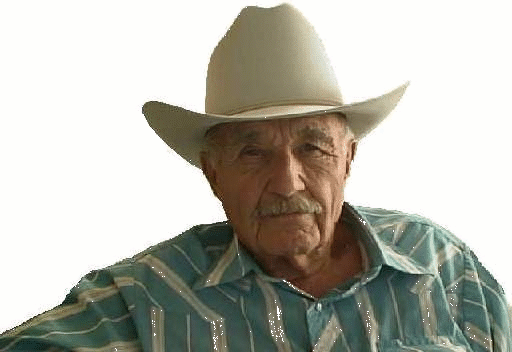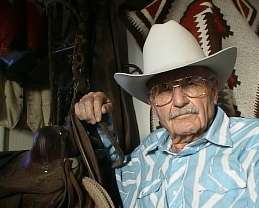Come Ride With Me


|
"My Dad bought me my first horse when I was eight," he says. Of course, he'd ridden way before then, and had cared for many horses on his family ranch, but it was at age eight when he became a cowboy with his own horse. Thomas was born in North Dakota - "You know, you can't help where you're born," and he moved on as quickly as he could. He spent his early years breaking horses for the U.S. Army. He worked his first rodeo at age fourteen. One day, in the middle of a 100 mile trail ride, a stage coach came by and delivered the mail. In the sack was a draft notice for Thomas, pulling him into World War II. The Army took this cowboy away from his home in the vast, open, arid ranchland and made him work in the jungle, a move that nearly killed him. They took this cowboy off his horse and made him a Communications Officer in the Phillipines. "Well, they don't put you in something you know," he says. Thomas could no longer be with the job he loved; working with horses, but he was now in a field he would learn to love, he would become a master of communication. Sometimes at night he would write letters home, and every so often he would include a stanza or two of poems he wrote.
Thomas was not suited for the jungle life. He caught black water fever, maleria and hepatitis-A, and he was sent home. "They didn't think I'd ever get back to work again," he says. "But I set my mind to not ever taking disability." Thomas was married that year, and he learned saddle making from a man in Montana. He opened a saddle shop in South Dakota. This didn't last long, because Thomas wanted more than to make saddles - he wanted to use them. He sold the shop in 1950 and went back to cow punching. While out on trail runs he would write letters to his wife, and some of these letters were in the form of poems. But why are there cowboy poets and not "farmer poets?" Just about everything in a cowboy's life makes it a rich opportunity for a writer, especially a poet. There are many long hours spent in the saddle, watching the beautiful scenery pass by, there's the close, working friendship with other cowboys and people, there's the animals you work with and the animals you work around. Where farmers today work with machinery, such as tractors and combines, cowboys do still ride horses. "There comes to be a real comaraderie between a horse and a man," says Thomas. Indeed, a horse can be a cowboy's best friend and most valuable tool on a daily basis. "A horse gets so it anticipates what you want it to do - you can make the slightest move and it will react. You get to where you can read a horse."
Where farmers work their farm and field and return to their beds at night, cowboys will ride the ranches for days, sleeping under the stars and eating from chuck wagons. It is a life of adventure, spectacular scenery, close bonds with other people and other beings, and of rugged beauty both within the barbed wire and within the soul. A cowboy learns to live his life by the things he loves, because these days, he can usually earn more money doing something else. So he loves the range, he loves his horse, he loves the freedom, the fresh air and the coffee on the fire. When you love something, you want to tell people about it, so you put it into words. "Poetry falls into place in a cowboy's life," Thomas says. "It becomes a part of your life." Part of a cowboy's life, for example is smoke. I could try to explain it for you, but I am neither a cowboy nor a poet, so you would be much more enriched if you were to let Thomas tell you, in "Wood Smoke" Thomas remembers a story his grandfather told him, about a century old gunfight in Baggs, Wyoming. Baggs was "Butch Cassidy's headquarters" according to Thomas, and one day, one of his men got himself in some trouble. From this story, Thomas penned "Two men" When reading Thomas' work, or any real, cowboy poetry, don't look for hidden symbolism or double meanings or any of that ivy league, flowery stuff. This is cowboy life, and the writing is all self taught and from the heart. If any cowboy poet actually took classes in poetry, he or she probably wouldn't admit to it. Cowboy poetry has become a cultural tradition in the west, celebrated with festivals, called "gatherings" in many states. Thomas remembers how the modern day gathering began, in 1985, in Elko, Nevada. Organizers asked several cowboys to recite their poems for anybody who would listen. They asked only poets who were "authentic cowboys, not just people that put on boots and hats and try and look like cowboys," says Thomas.
Well, anybody who would listen was a whole crowd of people, and the media also showed up. The Elko gathering is now a five day event, and there are gatherings in Arizona, Montana, Wyoming, Utah, Colorado and New Mexico, according to Thomas. Thomas has recited his poetry at over ninety gatherings, including the one in his home town of Wickenburg, called "A Cowboy Christmas." He is scheduled to recite at this event, on December 4-6, but you won't see him there; a recent bout with congestive heart failure will keep him home that weekend, with his wife Karen. He will miss being at the tenth annual event as much as people will miss him. "It's like a family reunion," he says. Before I leave, I ask Tommy Thomas if he will pose in front of my motorcycle for me, sort of an "old cowboy with a modern-day horse" kind of dumb idea, and he looks at me like I just kicked his dog. "Why would I want to do that?" he says. I fumble for an answer and he says, without a suggestion of humor; "I think my horse would be insulted." When a cowboy recites his poetry, he is sharing his life with you. He is showing you what it is like to live on the range, to work with animals among nature, to put your head down on a bedroll and let the stars put you to sleep. The poet is bringing you into the lonely, exciting and romantic life of a cowboy, and he is asking you to "come ride with me."
|

Check out the True America Features Archives
Return to our
MAIN page